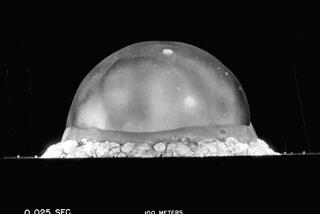Once a Visionary, He Later Took On Reactionary Role
- Share via
At the end of World War II, Capt. Hyman G. Rickover was a visionary, one of several U.S. Navy officers who saw nuclear fission as much more than just atomic bombs. These men envisioned the promise of nuclear energy for moving ships swiftly and efficiently both on and under the sea. As the legend grew around Rickover, the other officers would be forgotten. All that would be remembered was that Rickover was given the task of coordinating efforts of the new Atomic Energy Commission with the Navy’s already established nuclear-propulsion program. He took on the job with an almost religious zeal.
To accomplish his task, Rickover developed his own modus operandi: When it suited his purposes, he ignored the Navy bureaucracy, tradition and, at times, even regulations. As the director of the Navy’s nuclear-propulsion program, he wore his Navy “hat” to fight the Atomic Energy Commission, and as head of the AEC’s naval-propulsion program he wore another “hat” to fight the Navy. Always he relied on his support in Congress for his ultimate survival.
Rickover’s efforts gave this nation the world’s first nuclear-propelled submarine, the Nautilus. But the accomplishment was not without cost. He created his own nuclear Navy within the real Navy. Because he could choose the officers whom he wanted in the nuclear program and could call congressional attention to superiors who “impeded” his work, Rickover was able to ruin promising careers. He strangled at birth other Navy programs that he perceived could threaten nuclear propulsion for surface ships as well as submarines. During sea trials of at least two nuclear submarines he had even endangered the ships through his precipitous orders, according to officers on board at the time.
But there was no retribution for these actions or for his open defiance of superiors because, to his influential supporters in Congress, he could do no wrong. Passed over for promotion by the Navy, Rickover got his admiral’s stars one by one because, as he described himself, he was “a creature of Congress,” not of the Navy.
The myriad ways--from not wearing a uniform to equating defense-contractor profit-making with fraud--he defied chiefs of naval operations, secretaries of the Navy and even Presidents.
By the 1970s Rickover’s views, once visionary, had become the failing sight of a reactionary. As an arch-conservative, he opposed innovation in the later generations of U.S. nuclear submarines. The result has been that leadership in most areas of nuclear-submarine technology has passed to the Soviet navy. Today the Soviets have many more nuclear submarines than has the United States, and Soviet submarines are faster, deeper-diving and carry more powerful weapons. Only in acoustic quieting and sonar performance does the U.S. submarine force now prevail. It fell to the Reagan Administration and to the youngest secretary of the Navy in the century, John F. Lehman Jr., to finally “fire” Rickover at the age of 81 (or 83, if his elementary-school records are to be believed). His feuding with defense contractors, his meddling in other Navy programs, his arbitrary treatment of naval officers were the immediate cause.
Rickover attempted to leave the stage with a “bang.” But in his last appearance before a congressional committee before his retirement, on Jan. 28, 1982, only three members of the Joint Economic Committee were in the room to hear Rickover’s strange valedictory address. Somewhat bitter, he predicted that the human race would probably wipe itself out with nuclear weapons. “I’m not proud of the part I played in it,” he said. Speaking of the warships and submarines that had been his life, he said, “I would sink them all” in the interest of mutual disarmament.
With his bitter farewell he dropped himself out of a Navy that seemed to quickly forget him--except for one glorious day in 1983 when his wife christened a nuclear-propelled attack submarine as the USS Hyman G. Rickover.
The disasters that Rickover had predicted would follow his firing have not occurred. The Navy “system” that he so long fought prevailed. That system, however, has incorporated the nuclear training and standards that he established and vigorously maintained. Also of long-term effect, his notorious officer selection policies and insistence on excellence have produced many outstanding naval officers.
But the modern U.S. Navy also reflects Rickover’s failures. The nuclear submarine committee still has a chronic shortage of officers, due in part to his personnel policies; U.S. submarine design concepts are overly conservative--beyond the demands of safety considerations; only in the last few years have nuclear-submarine officers been assigned to the broadening experience of attending the Naval War College.
Rickover has left the Navy and the nation with several lasting contributions and several myths. The most important contribution was that of excellence; the principal myth was that he dragged the Navy into the nuclear age. Perhaps most important, he was a man who could obtain unprecedented power in the U.S. military establishments, and he used that power to obtain his goals. In his farewell congressional testimony he said that he had a solution to the disarmament problem. It was his solution to any problem: “Put me in charge of it.”
More to Read
Sign up for Essential California
The most important California stories and recommendations in your inbox every morning.
You may occasionally receive promotional content from the Los Angeles Times.













